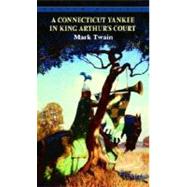
Note: Supplemental materials are not guaranteed with Rental or Used book purchases.
Purchase Benefits
What is included with this book?
| Preface | p. ix |
| A Word of Explanation | p. 1 |
| Camelot | p. 7 |
| King Arthur's Court | p. 9 |
| Knights of the Table Round | p. 14 |
| Sir Dinadan the Humorist | p. 18 |
| An Inspiration | p. 21 |
| The Eclipse | p. 26 |
| Merlin's Tower | p. 31 |
| The Boss | p. 36 |
| The Tournament | p. 41 |
| Beginnings of Civilization | p. 46 |
| The Yankee in Search of Adventure | p. 50 |
| Slow Torture | p. 56 |
| Freemen! | p. 60 |
| "Defend Thee, Lord!" | p. 67 |
| Sandy's Tale | p. 70 |
| Morgan Le Fay | p. 77 |
| A Royal Banquet | p. 82 |
| In the Queen's Dungeons | p. 90 |
| Knight-Errantry as a Trade | p. 98 |
| The Ogre's Castle | p. 101 |
| The Pilgrims | p. 107 |
| The Holy Fountain | p. 117 |
| Restoration of the Fountain | p. 125 |
| A Rival Magician | p. 132 |
| A Competitive Examination | p. 141 |
| The First Newspaper | p. 151 |
| The Yankee and the King Travel Incognito | p. 160 |
| Drilling the King | p. 166 |
| The Smallpox Hut | p. 170 |
| The Tragedy of the Manor House | p. 175 |
| Marco | p. 183 |
| Dowley's Humiliation | p. 189 |
| Sixth-Century Political Economy | p. 195 |
| The Yankee and the King Sold as Slaves | p. 205 |
| A Pitiful Incident | p. 214 |
| An Encounter in the Dark | p. 220 |
| An Awful Predicament | p. 223 |
| Sir Lancelot and Knights to the Rescue | p. 229 |
| The Yankee's Fight with the Knights | p. 231 |
| Three Years Later | p. 242 |
| The Interdict | p. 246 |
| War! | p. 250 |
| The Battle of the Sand Belt | p. 260 |
| A Postscript by Clarence | p. 271 |
| Table of Contents provided by Syndetics. All Rights Reserved. |
The New copy of this book will include any supplemental materials advertised. Please check the title of the book to determine if it should include any access cards, study guides, lab manuals, CDs, etc.
The Used, Rental and eBook copies of this book are not guaranteed to include any supplemental materials. Typically, only the book itself is included. This is true even if the title states it includes any access cards, study guides, lab manuals, CDs, etc.
Excerpted from A Connecticut Yankee in King Arthur's Court by Mark Twain
All rights reserved by the original copyright owners. Excerpts are provided for display purposes only and may not be reproduced, reprinted or distributed without the written permission of the publisher.